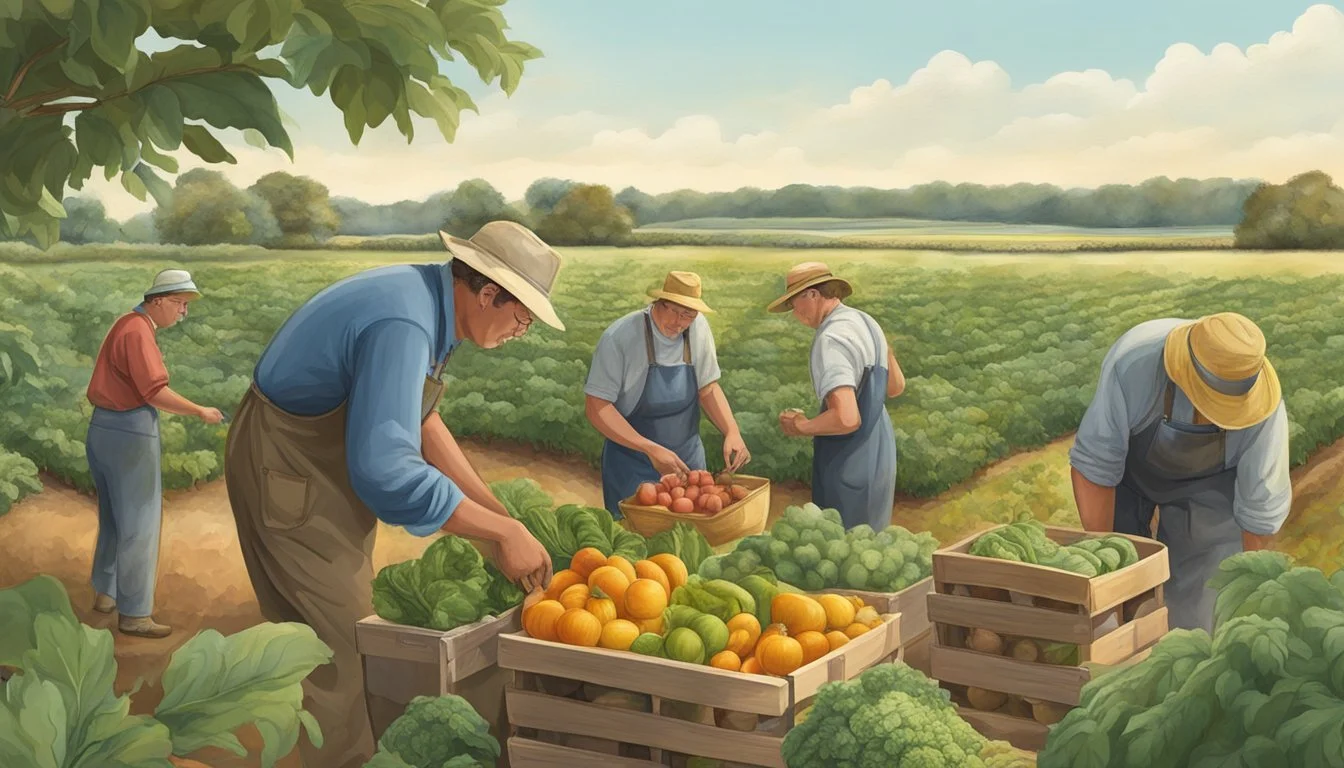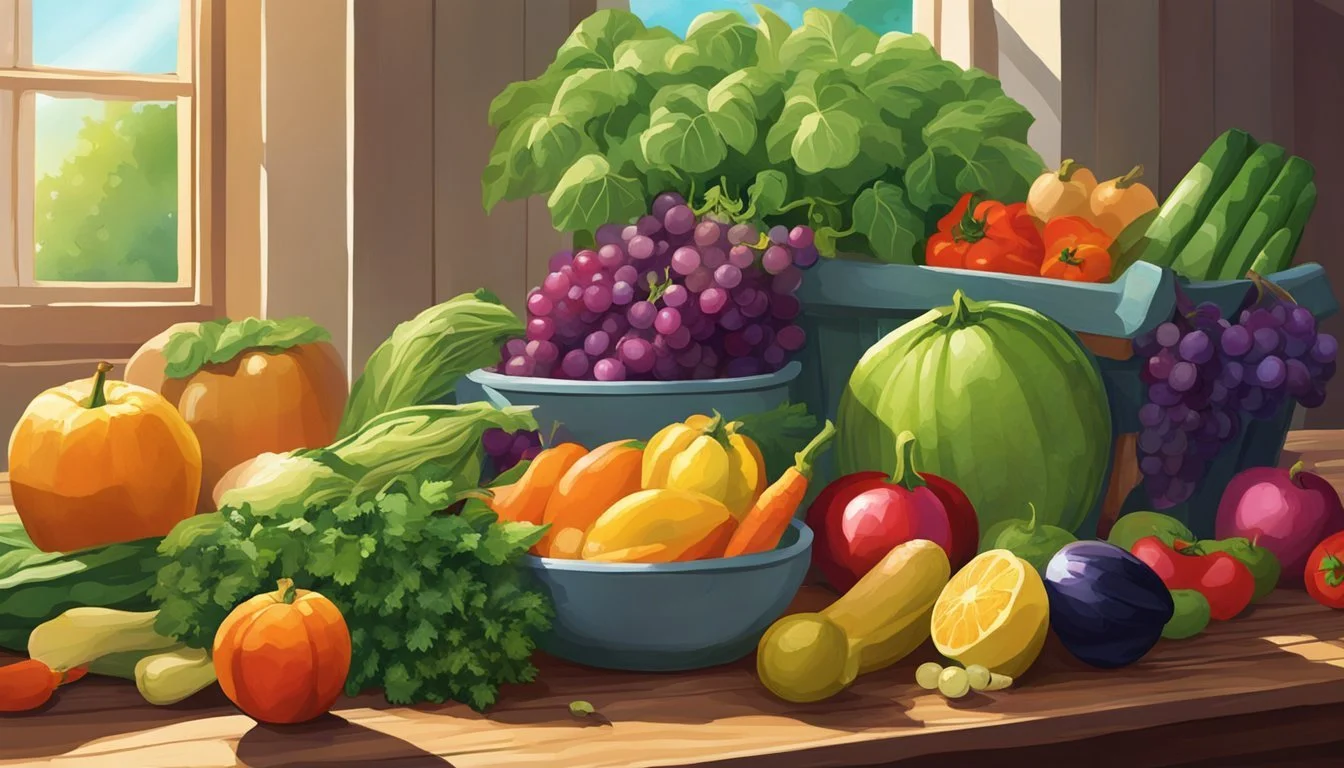Delaware Seasonal Fruit & Vegetables in July
Your Guide to Fresh Produce
This Article is Part of our Delaware Seasonal Fruit & Veg Calendar
Delaware's agricultural landscape comes alive in July, marking the peak of summer with a vibrant assortment of fruits and vegetables. This mid-Atlantic state, with its temperate climate and fertile soil, offers a plethora of fresh and locally-grown produce. From sweet, juicy berries to crisp vegetables, the abundance of the season provides a bounty for both local consumers and markets.
During this month, Delaware farms are teeming with ripe produce. They offer a variety of berries, including the luscious blackberry, which reaches its prime in the warmth of July. Stone fruits like peaches also begin to make their eagerly awaited appearance on farm stands. The vegetable patches are not to be overshadowed, with tomatoes, sweet corn, and green beans in ample supply, reflecting the rich agricultural tradition of the region.
Consumers looking to indulge in the freshest food will find July in Delaware an opportune time to engage with local growers and partake in the harvest. The connection between the land and the table is unmistakable, as the produce available during this season is at its peak in flavor and nutritional value. The diversity of Delaware's seasonal offerings in July encourages not only healthy eating but also supports the local agricultural economy.
Summer Fruits
In July, Delaware’s orchards and farms become abundant with a variety of summer fruits known for their juicy and sweet flavors. These fruits not only add a burst of freshness to the summer heat but also provide essential vitamins and nutrients.
Berries
Delaware’s berry season is in full swing come July. One can find a selection of berries ripe for picking, with strawberries beginning to wane and blueberries (how long do blueberries last?), blackberries (how long do blackberries last?), and raspberries taking the spotlight.
Strawberries: Early July often marks the end of the strawberry season.
Blueberries: These nutrient-dense berries are typically available throughout the month.
Blackberries: Starting in July, blackberries are ready for harvest.
Raspberries: Look for raspberries to start coming into season in Delaware during this month.
Stone Fruits
Stone fruits thrive in the warm July temperatures of Delaware. Known for their pit and succulent flesh, these fruits are favorites for fresh eating, desserts, and preserves.
Peaches: Juicy and fragrant, peaches are quintessential summer fruits.
Nectarines: Similar to peaches but with smoother skin, nectarines are also ripe for enjoyment.
Plums: With a variety of plums available, they offer a sweet to tart flavor range.
Melons
Melons provide cooling hydration and are often used in salads, desserts, or served on their own as a refreshing snack. In Delaware, two popular varieties are in season:
Watermelon: A staple at picnics, watermelons signify the taste of summer.
Cantaloupe (how long does cantaloupe last?): Also known as muskmelon, it boasts a sweet, delicate flesh.
Summer Vegetables
July is a vibrant month for vegetable harvesting in Delaware. The warm climate ensures a bounty of summer vegetables that are perfect for a variety of fresh, seasonally inspired dishes.
Fleshy Vegetables
Delaware's July harvest brings a selection of fleshy vegetables that are rich in flavor and nutrients. Among these, gardeners and consumers can find various types of squash. Summer squash and zucchini are versatile in the kitchen, used in everything from salads to sautéed dishes. (What Wine Pairs Best with Sautéed Dishes) Furthermore, eggplant boasts a meaty texture making it a favorite for grilling and Mediterranean recipes.
Tomatoes: Known for their juiciness, these are prime for sauces, salads, and sandwiches.
Cucumbers: (how long do cucumbers last?) Crisp and refreshing, often found in salads or served as a cooling snack.
Peppers: Ranging from sweet to hot, peppers enhance the taste of many summer dishes.
Podded Vegetables
Come July, podded vegetables are at their peak in Delaware. Snap beans, commonly referred to as green beans, are tender and easily cooked in a myriad of ways. They are a staple for many home cooks due to their ease of preparation.
Beans: Both bush and pole varieties are harvested, with flavors that are best when freshly picked.
Leafy Greens
Even in the heat of summer, certain leafy greens thrive. These vegetables are essential for a nutrient-rich diet and can be enjoyed raw or cooked.
Kale: This hearty green withstands the summer heat better than many other greens, making it a great choice for continuous harvesting.
Spinach and lettuce: They tend to favor the cooler days of July but can still be found fresh, particularly when grown in shaded areas or harvested in the morning to avoid wilting.
Broccoli: While it generally prefers cooler temperatures, there are heat-tolerant varieties that do well during the Delaware summer.
Harvesting and Preservation
In Delaware, July marks the peak season for a variety of fruits and vegetables, making it an ideal time for harvesting and ensuring proper preservation to extend the enjoyment of these fresh flavors.
Picking Tips
When harvesting fruits and vegetables in July, one should look for signs of ripeness that indicate flavor at its peak. For example, tomatoes should be firm and fully colored, blueberries should be deep blue with a light gray bloom, and peaches should give slightly to palm pressure and have a sweet fragrance.
Tomatoes: Firm, fully colored
Blueberries: Deep blue, light gray bloom
Peaches: Slight give to pressure, sweet fragrance
Storage Guidelines
After harvest, proper storage is crucial for maintaining the freshness of produce. Most fruits are best kept in the fridge where they can remain fresh for longer periods. Vegetables like cucumbers and bell peppers also benefit from refrigeration, while onions and potatoes should be stored in a cool, dark place.
Fruits (e.g., berries, peaches): Store in the fridge in a single layer to prevent bruising.
Vegetables (e.g., leafy greens): Keep in the crisper drawer of the fridge. Use perforated bags for ventilation.
Preservation Methods
For those looking to preserve the bounty of July's harvest, there are several methods to consider. Freezing is optimal for many fruits and vegetables, preserving their flavor for later use in smoothies or salads. Items such as cucumbers can be pickled for a tangy addition to meals. Here are basic guidelines for preservation:
Freezing: Blanch vegetables, cool them quickly, and store in airtight containers. Berries can be frozen whole on a baking sheet before transferring to containers.
Pickled: Clean and cut vegetables; submerge in a vinegar, water, and salt solution; and seal in jars.
Produce preserved through these methods can provide a taste of summer even during the colder months, ensuring that the vibrant flavors of July's harvest can be enjoyed throughout the year.
Culinary Uses
In July, Delaware's bounty of fruits and vegetables takes center stage in a variety of culinary applications. Chefs and home cooks alike have the opportunity to transform these fresh ingredients into both classic and innovative dishes.
Sweet Applications
Delaware's July harvest allows for a myriad of sweet applications. Stone fruits like cherries, peaches, and plums can be baked into desserts such as pies, tarts, and crisps. The versatility of fruits like blueberries is evident as they make excellent jams or compotes, enhancing the flavor of pancakes, yogurts, or cheesecakes. For a refreshing treat, blend cantaloupe or watermelon into a bright, chilled soup or add them to a fruit salad. These ingredients not only contribute to the taste but also to the visual appeal of desserts with their vivid colors.
Savoury Dishes
Incorporating July's produce into savoury dishes offers a different avenue to explore their potential. Vegetables like broccoli and cauliflower can be roasted or grilled to serve as a wholesome side dish. They can also be combined with other seasonal items to create vibrant salads and pickles. Making salsa with fresh tomatoes and peppers captures the essence of summer, perfect for complementing grilled meats (What wine goes well with grilled meats?) or as a snack with tortilla chips. Beets, known for their earthy flavor, can be sliced into salads, blended into soups, or pickled for an added burst of taste and color.
Delaware's Produce Scene
In July, Delaware's agriculture blooms with a variety of fresh produce, providing ample opportunities for consumers to engage with local growers.
Local Farmers' Markets
Farmers' markets across the state serve as a vital connection between consumers and family farms. Delaware hosts multiple markets, where one can find just-picked fruits and vegetables packed in containers ready for purchase. Markets like the Historic Lewes Farmers Market and the Rehoboth Beach Farmers' Market are bustling hubs in July, showcasing the bounty of local farms. These gatherings support the state's agricultural economy and offer a space for residents and visitors to explore the region's produce offerings.
Notable Delaware Farmers' Markets in July:
Historic Lewes Farmers Market
Rehoboth Beach Farmers' Market
Dover Farmers' Market
Fresh Finds in July:
Peaches
Blueberries
Summer Squash
Agricultural Events
Besides the weekly farmers' markets, Delaware's agricultural scene is characterized by seasonal events that celebrate local farming heritage. July may feature specific events at farms such as Christmas tree farms transitioning to host summer activities or corn mazes later in the year. These events often provide educational insights into farming practices and allow visitors to experience agriculture hands-on. The state's Department of Agriculture actively promotes these events to highlight the importance of agriculture in Delaware's culture and economy.
Sample July Agricultural Events:
Farm tours and open houses
U-pick opportunities at local farms
Agriculture-based festivals and fairs
Nutritional Benefits
Consuming Delaware's seasonal produce in July ensures one is enjoying fruits and vegetables at their peak nutritional value. The local harvest offers a range of vitamins, minerals, and dietary fiber important for a balanced diet.
Vitamins and Minerals
Delaware's July harvest notably includes berries, leafy greens, and tomatoes, each a powerhouse of essential nutrients. For example:
Berries: Rich in vitamin C and antioxidants, they support immune function and skin health.
Leafy Greens: These vegetables, such as lettuce and spinach, are abundant sources of vitamins A, C, and K, as well as minerals like iron and calcium.
Tomatoes: High in vitamins A and C, they also contain a beneficial antioxidant called lycopene.
Dietary Fiber
Seasonal produce is not only flavorful but also provides necessary dietary fiber, which is integral for digestive health. The fiber content varies among July's seasonal offerings:
Berries: They offer a high fiber-to-calorie ratio, assisting in satiety and bowel regularity.
Leafy Greens: These greens contribute to fiber intake, which can lower cholesterol and stabilize blood sugar levels.
Agricultural Practices
In Delaware, farmers adopt a blend of traditional and modern agricultural practices to ensure the provision of seasonal fruits and vegetables. They often employ sustainable methods that conserve water, preserve soil quality, and reduce chemical inputs. Agriculture in the state encompasses both conventional and organic farms, each adhering to specific protocols to yield the best crops while being mindful of environmental impacts.
For instance, organic farms are certified to follow standards that exclude synthetic pesticides and fertilizers. These farms focus on maintaining ecological balance and biodiversity, utilizing methods such as crop rotation, green manures, and biological pest control. In July, these practices are particularly important as they contribute to the health and growth of summer crops like tomatoes, cucumbers, and sweet corn.
Sustainable agriculture is a core practice among Delaware farmers, showcasing their commitment to responsible farming techniques. They strive to:
Enhance environmental quality
Make efficient use of resources
Maintain economic viability
Farmers also incorporate the following practices:
Integrated Pest Management (IPM): A strategic approach to manage pests using the least possible disruption to agricultural ecosystems.
Soil Conservation: Techniques such as no-till farming, cover cropping, and contour plowing to prevent erosion and loss of nutrients.
Farmstands and farmers markets see a surge in activity during July, providing locally-sourced and often organic produce to consumers. This not only supports the local economy but also promotes the circulation of high-quality, seasonal fruits and vegetables.
In conclusions, Delaware's agricultural practices in July are reflective of a deep understanding of the delicate balance between farming and nature, ensuring that the state’s agricultural output is robust and sustainable.








